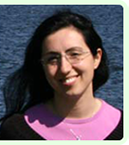Being a Marie Curie Fellow in Social Sciences and Humanities (SSH)

Angela Bellia (Italy), Cristina Castellano (Mexico), Elisabetta Crocetti (Italy), Maria Pichou (Greece) and Silvia Riva (Italy) are Social Sciences and Humanities (SSH) researchers. Here they explain what this field represents for them and what their expectations are for their future research, especially in relation to the Horizon 2020 Programme.





Diversity in fields of research. The research conducted by our five Fellows spans a large range of topics. Having benefited from an International Research Staff Exchange Scheme (IRSES), Castellano’s project is creating a permanent interdisciplinary research and training network in the field of gender studies. Crocetti is a psychology researcher and spent his Intra-European Fellowship (IEF) studying how adolescents develop their identity. Also a psychology researcher, Riva received funding to join a Research Training Network (RTN) forming a pool of experts in health and disability research and management. Bellia’s project (International Outgoing Fellowships for Career Development – IOF), spanning both musicology and archaeology, is dedicated to the musical culture of Selinus, one of ancient Greece’s biggest cities, famous for its cult and religious practices. Pichou’s project is co-funded by the Marie Curie Actions for two years; it focuses on the role that national courts play in the development of International Criminal Law.
An added value for research and innovation. To Castellano, SSH research can help create a better society “more inclusive and fair, in terms of gender, for example”. Conducting research in SSH is for Crocetti above all a passion. She explains that “understanding psychosocial development of adolescents and young people is a truly fascinating enterprise”. The fact that outputs can be used to implement social policies represents in her eyes and added value that only SSH can bring. To Bellia, SSH generate “growth, employment and competitiveness in a knowledge society through technology”. Pichou takes a different approach, pointing to the roots of democracy “The study of humanistic topics has been at the heart of a democratic education since the ancient Greeks first used them to educate their citizens. To this extent, research in SSH expands our horizons, opens our minds and helps us understand our society, economy, legal system, history, art and finally ourselves, which is the ultimate goal of each human being.”
The Vilnius Declaration establishes the basis for the integration of the SSH into Horizon 2020. Crocetti is quite optimistic that the Vilnius Declaration will support research in SSH. Nevertheless, she stresses the importance of “shaping new joint communities of scientists, able to research the same issue from different, but integrated, perspectives”. Our other Fellows admit that they were not aware of the Declaration. Riva points out that research opportunities remain limited for psychologist and social researchers in general.
The Network of National Contact Points for Socio-economic Sciences and the Humanities (NET4SOCIETY) aims at increasing SSH visibility, facilitating knowledge exchanges and improving support to researchers. Again, our Fellows were largely unaware of the network and of the many opportunities it can offer SSH researchers. To Crocetti, the network should foster cross-sector cooperation, and especially connections between SSH and small and medium-sized enterprises (SMSs) and the “third sector” (associations, non-governmental organisations, etc.).
Expectations for Horizon 2020. Our SSH Marie Curie Fellows share high expectations for the new framework programme. They hope to see new funding for their respective fields of research (Law, Psychology, Archeology, etc.) and for young researchers. Bellia hopes for “larger attention for Cultural Heritage in Europe”. Pichou also aspires for SSH under Horizon 2020 to contribute in building “societies that are not technocratic but also ethical”.